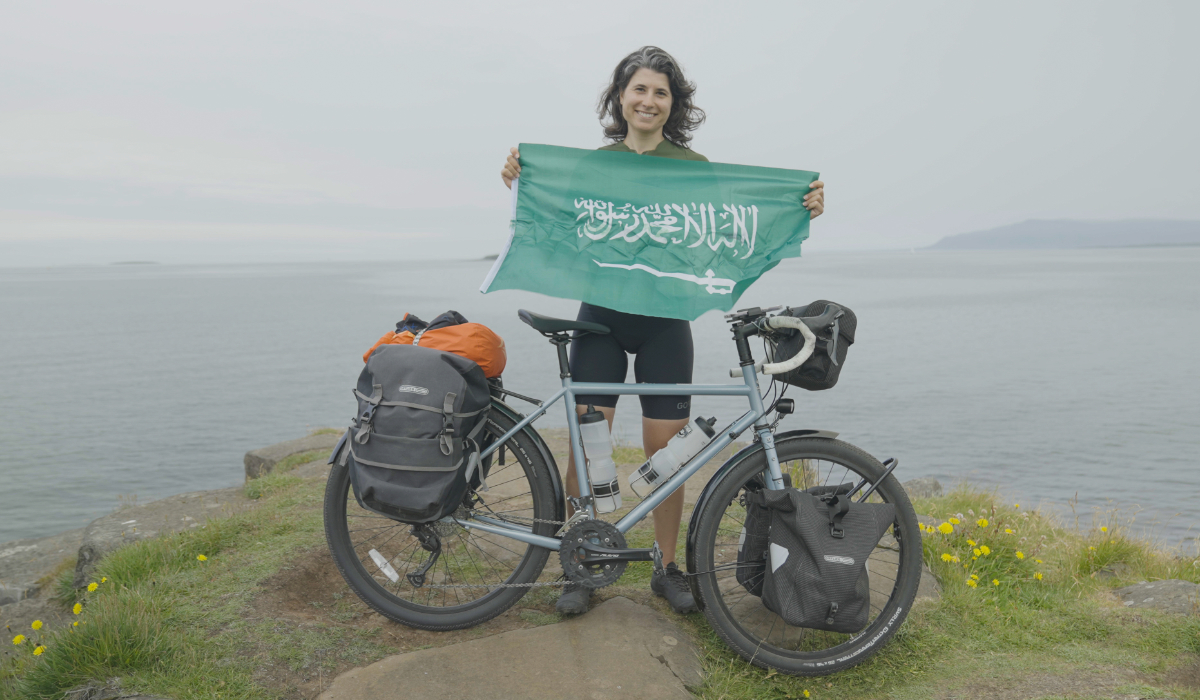RIYADH: Earlier this year, Yasmine Idriss sat down with Arab News just before setting off to Iceland to cycle the country’s Ring Road on the journey of a lifetime. Now, she has become the first Arab woman to complete the grueling trip.
Initially, she thought her time on the road — which runs for almost 1,400 km — would give her the chance to plan her next career move. Little did she know she would pedal her way to much deeper enlightenment.
Her entire journey, from raging winds to sweet serenity, is captured in a documentary film titled “Threshold,” due out in 2024.

Yasmine Idriss has made history as the first Arab woman to complete the grueling 1,400 km cycling trip along the Nordic Ring Road. (Supplied)
“I open up quite a bit (in the film) about what this was for me and what the ‘heroine’s journey’ is. The heroine’s journey isn’t just a woman going through the hero’s journey. (It) has a lot more surrender embedded in it, and that’s a huge theme of what Iceland was for me,” she told Arab News.
While Idriss knew there was no way to replicate the effects of Iceland’s biting winds during her training period, she hadn’t expected them to be quite as fierce as they were — she faced the highest winds of the entire season and was blown off track in all directions. With oncoming traffic on one side and sharp rocks on the other, she prayed for stability.
HIGHLIGHTS
• Yasmine Idriss’s entire journey is captured in a documentary film titled ‘Threshold’ due out in 2024.
• Kathi Hendrick helped create the narrative for the documentary while Madison Hoffmann is the lead filmmaker.
“It was a very brutal welcoming to what this Ring Road journey was going to be about,” she said.
With the exception of just two days in her three-week trip, the wind was constant — not stopping “even for a second,” she said. While most life challenges come in waves, ebbing and flowing, the continuous assault brewed frustration.
“Why? What is the purpose? What can I be learning from this? Why is this so hard?” Idriss says she wondered.

Yasmine Idriss, Cyclist
Her close friend — and one of her two companions on the road — Kathi Hendrick, said to her: “Wind stops inertia, wind forces you to move, it forces you to be awake, otherwise you would fall.”
The physical challenges paralleled the emotional. Realizing that she was exerting more strength than needed, she surrendered.
“The muscles that needed to be working were working, and the muscles that didn’t need to be working were relaxed. Psychologically, how that translated was: I just let anything that needed to happen, happen,” she explained.
I feel proud to be able to represent Saudi women. I don’t feel like I’m the first. There are so many amazing Saudi women who have paved the way for me, (who have) done amazing things (and) are doing amazing things.
Yasmine Idriss, Cyclist
Hendrick supported the cyclist on the trip and helped create the narrative for the upcoming documentary, while Madison Hoffmann, also a good friend, was the lead filmmaker.
Idriss said: “Somehow the three of us were mirroring each other’s experiences. Each of us was going through something very similar; even though I was on a bike and they were in the van, there was a sort of synchronicity that was happening. It was just really beautiful to see the magic that can happen when women come together in a supportive way.”
The trip was meant to help clarify what the next chapter of her life would look like. Idriss had just left her position as the head of a sustainable footwear company, which she thought was her dream job.
Removing herself from the responsibilities of daily life, and being disconnected from family and friends, ignited a deep transformation, as trips of this nature tend to do. “Over 20 days on the bike, it was an inward journey,” she said.
While there was no hiding from the elements, there was no avoiding the self either. From ending a close relationship to facing difficult questions, “everything was brought to light,” Idriss said, adding that that was exactly what she needed.
Idriss is now advocating for time away to recharge and innovate in a hyper-productive society, packed with intense working hours and social commitments.
She explained: “For Vision 2030, we’re developing like crazy. We’re one of the fastest developing countries in the world, and it’s happening with such beautiful leadership. We also need rest, and we need space, and we need to take care of ourselves in order to be as productive as our communities need us to be right now.”
While she primarily embarked on the journey for her own self-exploration, she humbly hopes to drive others to do the same.
“I feel proud to be able to represent Saudi women. I don’t feel like I’m the first. There are so many amazing Saudi women who have paved the way for me, (who have) done amazing things (and) are doing amazing things,” she said. “If I can be a mirror for the world to look at what women are doing in Saudi Arabia, then that would be a huge privilege. And if I can inspire others to go on their own road, whether that’s a walk in the neighborhood, or climbing Mount Everest like Raha Moharrak, then I have accomplished my mission.”
Immersing herself in the landscapes of Iceland, with all the challenges and revelations that it brought, inspired her to “(bring) this work to others and invite others into similar journeys of transformation in a very different form. This is what I’m working on next.”
















